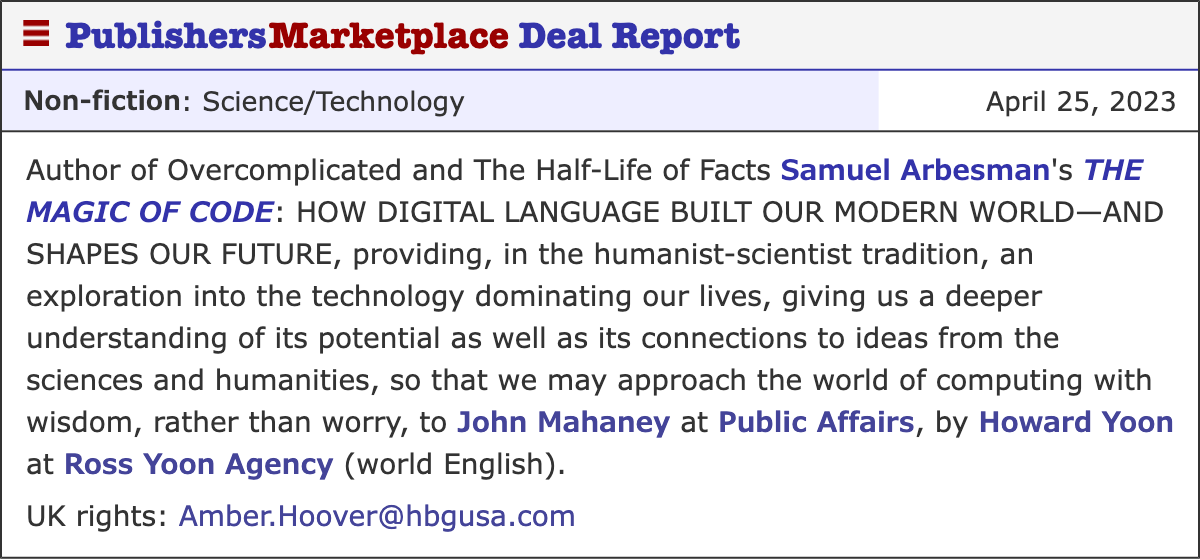☞ The Magic of Code
I'm writing a new book! Follow along on the journey.
Many of you are familiar with my obsessions: the complexity of technology, glitches and bugs, how coding is like magic, old texts, simulation, HyperCard, tools for thought, and artificial life.
Well, I’m thrilled to announce that I’m currently writing a book that will combine all of these themes and more together. It’s tentatively titled The Magic of Code: How Digital Language Built Our Modern World—and Shapes Our Future. I’m working with John Mahaney at PublicAffairs at Hachette and am incredibly excited:
The book is an attempt to convey how strange and wonderful computation—and all of its implications—truly is. I like to think of code as a sort of reverse centrifuge, spinning huge numbers of topics together and intimately connecting them. These topics range from our attempts to model the world, the nature of history, how we think and use language (both natural and computational), to even biology, philosophy, and serendipity. But too many of us take computing’s omnipresence for granted. It’s time we defamiliarize the nature of code and all that it touches.
The novelist Richard Powers has described the novel as a “supreme connection machine.” (note: link is a pdf) While this book will not be a novel, I hope that it can act in the same manner, as a massive connective engine between a huge number of topics.
This book is going be weird and wild, going far beyond what most readers might expect from a book about the computational realm. I plan to explore 1970’s simulations of our entire planet, reference the Talmud while discussing video games, examine Greek mythology and software projects, look at the similarities between Biblical prose and programming languages, and quote fantasy novels. And of course, AI will make an appearance, as it suffuses topics from prompt engineering to how code is being written (and its future), though I’ll try to tackle it from a bit off-kilter perspective (eg. the opcodes of Story World).
My goal is to explain the mysteries that underly code and computation and their importance to those new to these areas, while also providing a novel mental lens for those who are already familiar with these topics. I hope this book can explain the wonder of this domain to a broad audience, providing a liberal arts-infused approach to the realm of computing.
Essentially, I’m hoping that my book will fulfill this goal:
There is a lot left to do, but if you’re interested in everything from the history of computing and emergent microcosms to ancient mythology and the development of spreadsheets, as well as how to inject a bit of wisdom and meaning into the rapidly changing world of computing, I encourage you to follow along on my journey by subscribing to this newsletter.
Following along will allow you to learn about various little delightful tidbits I discover along the way, see ideas in their embryonic form—my newsletter’s archives should give you a good taste of what is in store—and even get a glimpse of the strange variety of books I’m looking at:
But I also want your comments! In my quest to explore all of these topics, I want lots of feedback and pointers to related ideas and examples. Suggestions and assistance are most welcome. And, of course, by subscribing, you will learn when this book will be released.
So please join me on this journey of curiosity and computation. I’m incredibly excited.






Aahhh, I've been looking for a book like this! So glad you're writing it. In no particular order:
George Dyson's new one, Analogia: The Entangled Destinies of Nature, Human Beings and Machines, touches upon analogue machines, trees that count.. all kinds of wonderful computational things.
James Bridle's Ways of Being, also for the nature & computation angle.
I like the way Algorithms to Live By: The Computer Science of Human Decisions by Brian Christian, Thomas L. Griffiths, and Tom Griffiths balances between technically solid, but still approachable.
There seems to be more "humanistic" math books out there - Once Upon A Prime, Weil Conjectures, A Divine Language: Learning Algebra, Geometry, and Calculus at the Edge of Old Age - that might serve as inspiration on introducing ideas. Oh, and of course anything by Carlo Rovelli for poetic physics!
I enjoyed browsing your stack of books. I hope you will write about Don Knuth. There are so many layers to Don, he deserves an entire book!